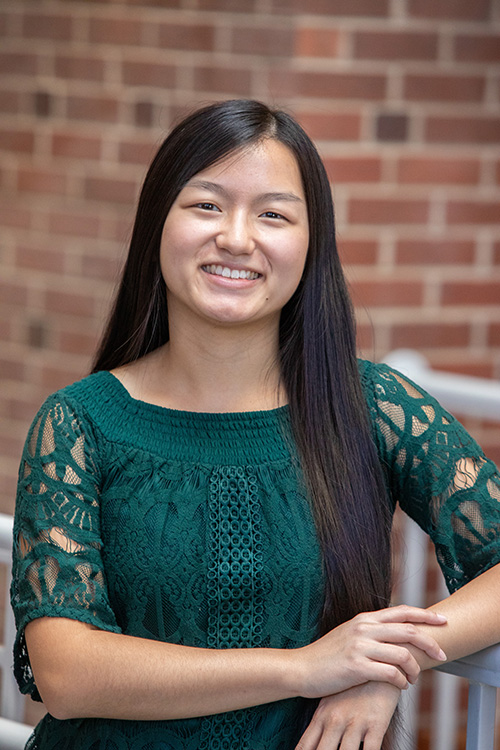- Apply
- Visit
- Request Info
- Give
Lilia Burdo self-publishes poetry exploring her Chinese-American adoptee identity
Written by Marcus Grant
Published on December 12, 2023

Senior English major Lilia Burdo has published a chapbook of poems, “Yin Ri Bei,” inspired by her life growing up as an adoptee from China.
Her chapbook, which is a small paper-covered booklet, stands out for its message of self-acceptance as Burdo has navigated a world with systemic biases toward Asian Americans, facing the “model minority” myth and other barriers.
Burdo began writing poetry last year, after taking English Professor Daniel Donaghy’s “Social Justice Literature Senior Seminar.” In the class, she and other students read poetry from authors of a diverse range of backgrounds, including “Toys Made of Rocks” by Jose B. Gonzalez, “Felon” by Reginald Dwayne Betts and “Seize” by Brian Dempster.
Inspired by what she read, Burdo began compiling a manuscript centered on her Chinese-American adoptee identity. The title, “Yin Ri Bei,” is the name given to Burdo in a Hunan, China, orphanage. Translated into English, it means “treasured sunset of Yiyang City.”
While an abundance of children’s literature exists centered around the identities of children adopted in the United States from China, relatable texts dwindle as adoptees grow older. “I noticed while writing my senior capstone project that there is a lack of poetry collections by Chinese Americans focusing on the adoptee identity,” said Burdo, “so my chapbook works to fill this literary gap, as well as provide comfort and a sense of understanding to those that identify similarly.”
In addressing this underrepresented group, Burdo hopes her work “can be a comforting resource for adoptees to make them feel understood and not alone in complex emotions about their identity” as she continues to engage creatively with the world.
“I've had a lot of time to think about the message each poem sends,” Burdo said. “The poems are vulnerable, raw and full of emotion, as they focus on some unpleasant experiences, but knowing that my work could help others like me embrace their identity makes it worth it.”
Taking images from nature, following a centuries-long tradition of Chinese art, Burdo complicates and obscures the natural beauty she writes of with the feelings that come with being unable to connect directly with her native culture. At the same time, her work recognizes that being an adoptee brings its own enjoyment and connections.
“Burdo’s ‘Yin Ri Bei’ is a brave, generous and deeply moving poetry collection of impressive maturity and emotional range,” said English Professor Daniel Donaghy, who supervised her work. “Burdo has a keen eye for precise sensory imagery and a sharp ear for the possibilities of word music and rhythm. And she puts everything she’s got, emotionally and intellectually, into every poem.”
"Lost Petal" is the first poem of Burdo’s collection and acts as an introduction to her as an author, as well as to her adoptee identity by, as she writes, “bringing to light that adoptees often lose ‘a family, a country, a culture’ without any agency over the situation."
“'Conversations Over Ice Cream’ is probably one of my favorite poems,” said Burdo. The poem surrounds the hypothetical situation of meeting her birth parents. “It describes how I might dress, where we'd meet and what I'd tell them. It was inspired by Aaron Caycedo-Kimura's ‘If this were the day,’ about what he'd do if it was his last day on Earth.”
"A Crown for Yin Ri Bei" is a sequence of sonnets that goes through Burdo’s life chronologically and details some of the most prominent events, challenges and realizations she’s had surrounding being an adoptee from another country. “The title of the chapbook is drawn from this poem,” she said. “It was one of the more difficult poems to write because of the poetic form I was following. It's a total of fifteen sonnets that connect to each other through the first and last lines of each individual sonnet, while the last sonnet is composed only of the first and last lines to create a unified whole.”
Burdo’s chapbook was printed with the help of the Emergent Scholars in English grant, provided by the Eastern Foundation. She intends to donate a large number of books to adoptees in the United States so they have literary content that they can relate to.
“The poems illustrate vulnerability and uncertainty, yet they also convey closure and acceptance. Ultimately, the chapbook is a celebration of the adoptee identity, highlighting the complexities that come along with it and the importance of embracing this unique position,” Burdo said. “I hope that adoptees are able to seek comfort in the poetry I've written and perhaps are even inspired to begin writing about their own experiences to better fill the literary gap and strengthen the adoptee community.”
“For fellow adoptees, these poems offer comfort by showing them that they are not alone on their journey within two cultures,” Donaghy said. “All readers will learn from ‘Yin Ri Bei’ more about our shared yearnings, fears and pursuits of answers to life’s aching questions. ‘Yin Ri Bei’ is an essential, beautiful book.”
Burdo will graduate this winter and plans to continue her education, pursuing a master's degree in educational administration.


